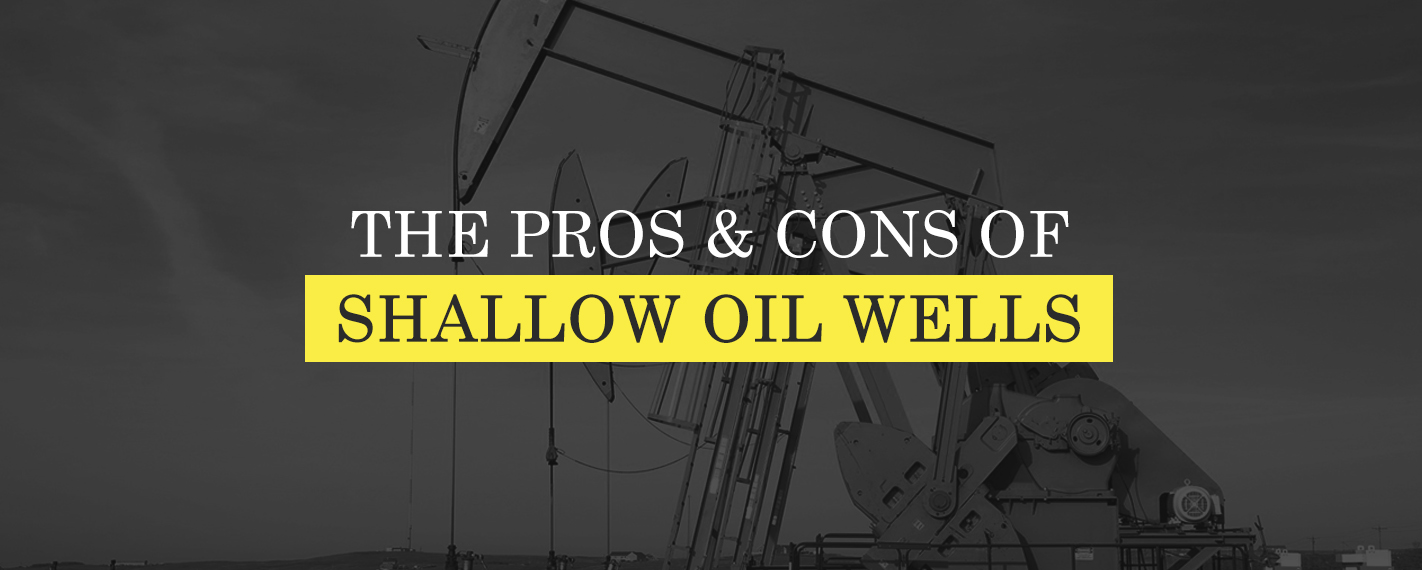The Pros & Cons of Shallow Oil Wells

Col. Edwin Drake drilled the world’s first oil well near Titusville, Pennsylvania, in 1859. This monumental breakthrough started a revolution in energy production, providing millions of jobs and billions of dollars to local economies in the subsequent years. Over time, the industry has evolved and advanced, adopting various technologies and techniques to make the most of our natural gas and oil resources. One of those techniques is the use of shallow oil wells.
Shallow wells provide many benefits to drilling operations. From cost benefits to surprising legal advantages, shallow wells are a reliable source of natural resources for many drilling companies. However, regulations vary significantly throughout the industry, depending on the location. For these reasons, it's crucial to be aware of the differences between shallow and deep wells from a legal standpoint and carefully consider which would be most advantageous for your operation.
What Is a Shallow Oil Well?
A shallow well generally refers to a design drilled to a relatively shallow depth compared to other types of wells. Operations often drill these wells where oil deposits are close to the surface or within shallow geological formations. Depths can vary based on application, location or a state's specific definition.
These wells are usually less expensive and easier to drill than deeper ones because they require less equipment and drilling time. Shallow wells commonly extract oil from reservoirs near the Earth's surface. They can provide valuable resources and contribute to local economies by producing oil for various purposes, like fuel and chemical production.
It's critical to note that while the definition of a shallow oil well is generally consistent, specific regulations and requirements for drilling and operating wells can vary by state due to different environmental and safety considerations.
Shallow Well Benefits
If an operation detects significant oil-bearing formations at shallower depths, drilling a shallower well could be more favorable than a deeper one. Shallow wells can offer a comprehensive range of benefits, including:
- Limited supply: Shallow oil wells typically tap into smaller oil reservoirs than deeper wells. A smaller reservoir can mean that the amount of oil extracted will be less, resulting in lower overall production and potential profitability.
- Shorter life spans: Shallow oil wells tend to deplete their reserves more quickly than deeper ones. Faster depletion often leads to a shorter well life, requiring additional drilling and exploration efforts to sustain production.
- Lower production rates: Shallow wells often yield oil at lower flow rates than deeper wells. The limited depth may result in less pressure and volume of oil produced in a specific amount of time, significantly impacting the overall profitability and efficiency of the well.
- Less exploration potential: Deeper wells offer the opportunity to explore and access oil reservoirs buried at greater depths. With shallow wells, the exploration potential may be constrained to relatively shallow geological formations, limiting the chances of discovering more expansive oil deposits.
It's essential to note that the drawbacks of shallow oil wells are not concrete and can vary depending on the specific geological conditions and economic factors of each drilling site. Careful evaluation is necessary to determine the optimal drilling strategy based on the possible drawbacks.
Shallow Oil Well Regulations
Understanding each state's definition and regulations is critical for planning a drilling operation. Most states regulate shallow wells differently than deep wells. Some states even have different regulatory agencies for each type.
These regulations aim to ensure the safe and environmentally responsible drilling and operation of shallow oil wells. Many of these regulations have to do with the legal considerations for the landowner and how closely oil wells can be drilled in proximity to one another.
Additional requirements cover a range of aspects, including obtaining permits and approvals before drilling, ensuring proper construction and integrity, managing the disposal of drilling waste, protecting groundwater sources and monitoring air emissions.
Regulatory agencies set design and construction guidelines — including casing and cementing requirements — to prevent oil or gas from escaping the well and contaminating the surrounding environment. They may also specify best practices for operation, like regular inspections, maintenance and reporting. In addition, many states often require environmental impact assessments and contingency plans for spills or accidents.
Oil companies and drilling operations must comply with these regulations to mitigate potential legal risks, protect the environment and ensure the safety of workers and nearby communities. Organizations can obtain specific rules from regulatory agencies responsible for overseeing oil and gas activities in the respective jurisdiction.
High-Quality Rubber Products
Despite the potential drawbacks of shallow oil wells, it's important to remember that shallow-well drilling costs are significantly lower than the industry standard and especially low compared to offshore drilling. Because of their cost-efficiency and productivity benefits, shallow wells are a viable source of income for drilling companies of all sizes.
To make it work, however, you need reliable and replaceable parts from a high-quality supplier. Global Elastomeric Products can help.
Global Elastomeric Products has been producing reliable rubber products for the oil and gas industry since 1963. We offer a wide range of high-quality elastomeric products, including valve seals, packer cups and shear-out joints, all produced to last. We even offer custom rubber molded products for specialized applications, providing solutions for even the most complex design needs.
Contact Us Today
At Global Elastomeric Products, Inc., we consider oilfield products as more than just a business. We're committed to offering the best product quality and service to every customer, regardless of their project's size. Contact us today to learn how our solutions can benefit your next shallow oil well project.
Links:
https://pioga.org/education/pa-oil-and-gas/
https://www.eia.gov/dnav/pet/pet_crd_welldep_s1_a.htm
https://apps.legislature.ky.gov/law/kar/titles/805/001/130/
https://www.legis.state.pa.us/WU01/LI/LI/US/HTM/1961/0/0359..HTM
https://www.globaleee.com/products/packer-elements-and-valve-seals/
https://www.globaleee.com/products/packer-cups/




